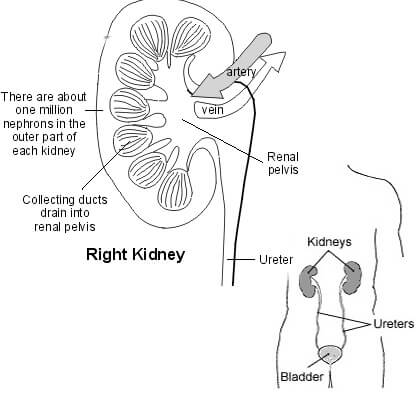How to Keep Your Kidneys Strong?
The number of people with chronic kidney disease is likely to rise. Your kidneys are responsible to support many body functions – they are so vital to keep you alive. Therefore, it’s important to look after them! Naturally, their function decrease with age. However there are also plenty of natural ways to help keep them strong and healthy, preventing them from failing.
You have two kidneys, bean-shaped organs located just below your rib cage (close to the middle of your back). Each about the size of a large orange or your fist! They are responsible of what to remove and what to keep in the bloodstream. In other words you need them to have normal, healthy-balanced blood.
A large artery carries blood from the heart to each kidney. This renal artery divides into many capillaries (very small blood vessels) throughout the kidney. Then the blood is filtered and cleaned from unnecessary things. The cleaned blood from each kidney goes and collects into a large blood vessel (large renal vein) – and then moves to the heart.

Every day, the kidneys can filter and process about a quarter of blood in the body. Unnecessary things (such as extra fluid and waste products) are removed and turned into urine that flows to the bladder through two tubes called ureters. And the bladder is used to store urine until you pee.
With thirst center in your brain, the kidneys are important to keep the balance of fluid in the body. For instance, when you’re being dehydrated, the kidneys can retain more water – learn more this mechanism in this section!
The following are other important functions of your kidneys:
- To release an active form of vitamin D that plays a role to help promote healthy, strong bones.
- To release hormones that control and regulate blood pressure. In fact, kidney damage can be a cause and a consequence of high blood pressure.
- To also help regulate the production of red blood cells. Therefore, anemia is quite common in patients with kidney disease.
High blood pressure (hypertension), chronic high blood sugar (typically in diabetics), or having genetic susceptibility (if you have a close relative such as parent or sibling with kidney disease) are common risk factors that put you at high risk of kidney disease. Even though if you don’t have one of these risk factors, it’s still important to take care of your kidneys!
Fortunately, there are a number of things you can do to help keep your kidney strong and make them as healthy as possible at every stage of your life.
Keep hydrated!
 Almost all systems in the body depend on water. It make ups most of your body weight. Even about 60 percent of the body weight is water!
Almost all systems in the body depend on water. It make ups most of your body weight. Even about 60 percent of the body weight is water!
Dehydration is a term used to call a condition of when the body doesn’t have adequate water to carry out its normal functions. When the balance water content of the body is impaired, it can lead to lots of consequences. Even mild dehydration may also have an effect.
Drinking adequate water every day is important to keep the body’s functions working at the correct pace. For instances it is required to help carry nutrients to the cells of the body, to flush wastes and toxins out of the body, – and to set a most environment for throat tissues, ear, or nose. It is also helpful to build muscle and maintain your healthy weight (learn more in here).
Keeping hydrated is also very important to keep your kidneys strong. By contrast, dehydration can make them work harder than usual. In fact, it is also a risk factor of developing kidney stones.
Frequently asked question; how much water should you drink daily?
But don’t also overdo it! There is still no evidence that over-dehydration does help improve kidney function.
Keep your blood pressure normal!
Hypertension (high blood pressure) can cause many health risks. Even it is one of the leading causes of kidney damage. Interestingly, kidney problem is also a cause of hypertension.
Having normal blood pressure is important for kidney function. To work effectively, the rate of blood flow to each kidney is kept at certain level. Hypertension can affect this rule, making the kidneys work harder. If you have hypertension, here is a guide to manage it!
Keep your blood sugar under control if you’re diabetic!
If you have diabetes, make sure to follow the treatment plan as well. Diabetes is dangerous condition when it has caused diabetic complications. Kidney disease is one of common diabetic complications. And chronic, poorly-controlled high blood sugar is to blame!
Keep your heart healthy!
Heart and kidneys are closely related. They do work very closely together. If something goes awry with your heart, your kidneys can be affected – and vice versa.
So it’s also important to have healthy heart for healthy kidneys. The good news, many good things for heart also have the same effect on the kidneys.
Weight control
Obesity is linked to lots of health risks, including kidney disease. Obese individuals (BMI ‘body mass index’ over 30) are twice as likely to have the disease, according to the National Kidney Foundation. The following are bad effects of obesity to your kidneys:
- Like heart, obesity can also add kidneys job – making them work harder.
- It is also a risk factor of hypertension and diabetes (chronic high blood sugar), two conditions that often cause kidney damage.
- Being obese may also affect the intensity of your physical activity. And lack of physical activity is also often to blame for kidney disease.
If you’re obese or overweight, there are lots of things to explore to help lose weight. See the comprehensive guide for your weight loss goal in here and here!
What to eat and what to avoid?
No matter whether or not you have kidney disease, your diet can play a key role to determine your overall health, including kidneys. Still, a balanced diet is the best choice to get all vitamins, minerals, and nutrients your body needs!
What are best foods to eat for your healthy kidneys?
Like anyone else – diet high in fiber, low in saturated fats & trans-fats, low in sugar, low in salt, adequate liquid, adequate calories, and loaded with essential nutrients (vitamins, minerals, and essential fatty acids) can be the key to keep your kidneys strong.
And eat anything in balance! Even good things such as fruits and veggies contain some calories. That’s why, all what you eat should fit into your daily calories intake! To gain the most health benefit from your diet, eat a wide variety of foods – don’t rely on particular food since each food has its own unique properties!
Here are other important points to remember for your healthy kidney diet:




EXCELLENT ARTICLE AND ADVISE TO KEEP HEALTHY KIDNEYS.
A very well laid out plan for kidney health. I am impressed. This article pertains to me…exactly. I am 80 years old and have most of the symptoms that are in this article. Well done…and thank you for the information.